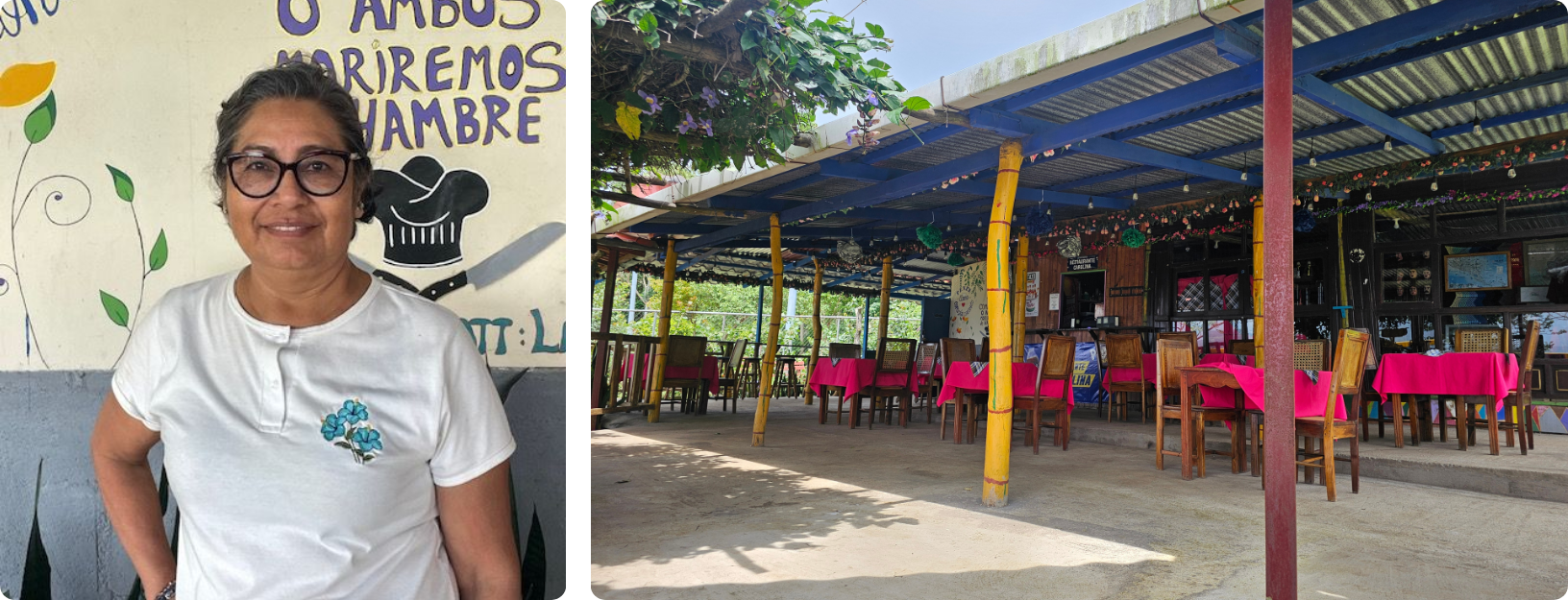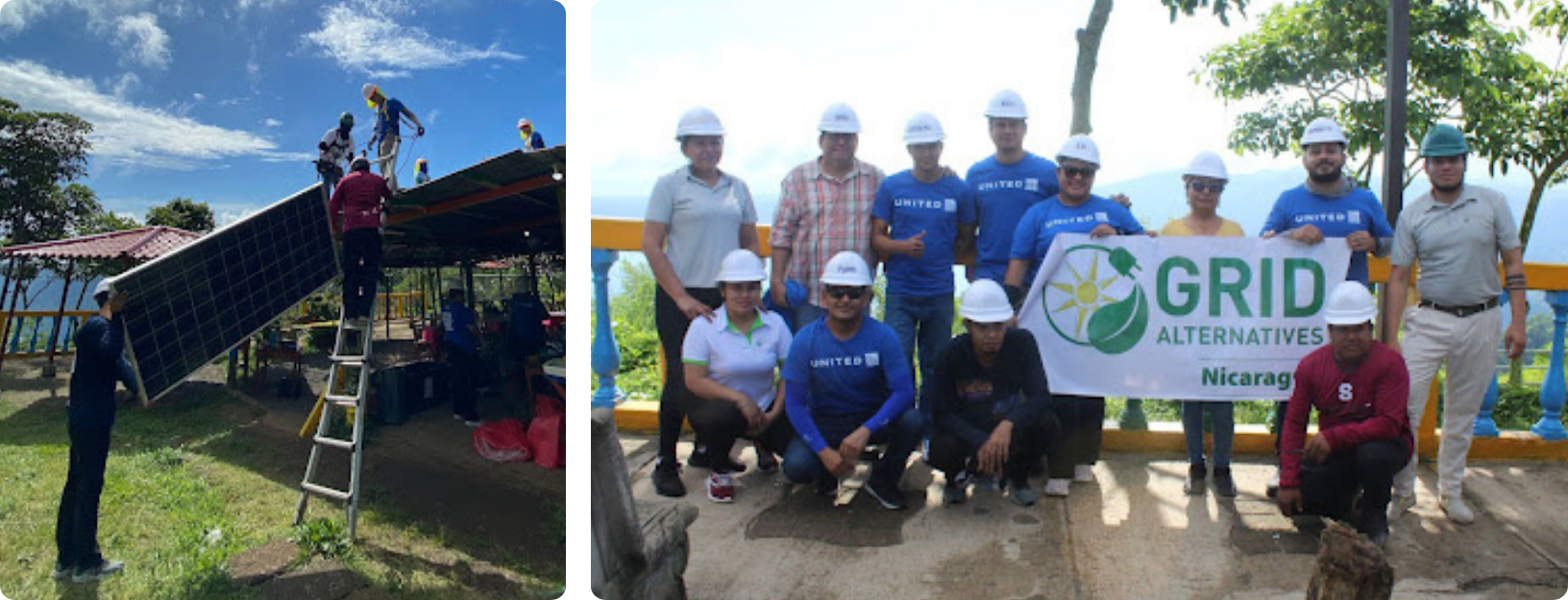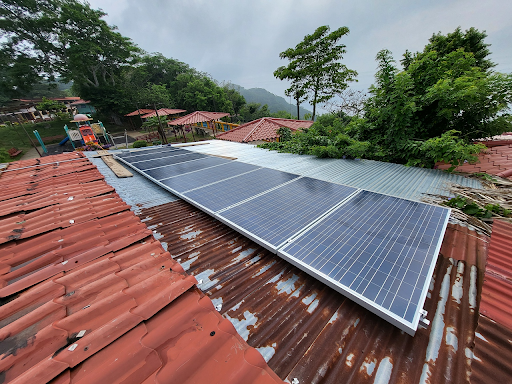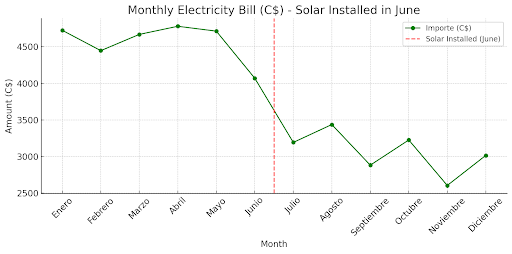Background
Catarina is a small municipality in Masaya with about 8,600 residents, best known for its scenic viewpoint over Apoyo Lagoon, vibrant artisan market, and flourishing plant nurseries. As part of the “Ruta de los Pueblos Blancos,” it attracts both local and international visitors, making tourism a vital source of income for families and small businesses.
While Catarina is connected to the national electricity grid, the high cost of power poses a major challenge for households and businesses. For restaurants and tourism enterprises, energy bills are a significant burden. Transitioning to solar energy offers a sustainable solution, lowering costs while reducing reliance on fossil fuels and strengthening local economic resilience.
Maria Eugenia Muñoz was the beneficiary of this project who divides her time between the family restaurant Carolina and tending to her garden, an activity she enjoys on her days off. She has three adult children: her eldest daughter, 40, is a medical doctor; her second son, 37, is a successful marathon athlete who has won several national and international trophies, works at the restaurant, and is sponsored by the family business; and her youngest son, 30, is a computer engineer who works online, bringing a technological perspective to the family. Her 57-year-old brother and her son’s wife are also part of the team at the restaurant, making it a true family-run endeavor.

The restaurant, as the center of both family activity and income, presents an excellent opportunity to enhance sustainability and reduce costs through solar energy, given its constant operation. In addition, with her children’s talents, one excelling in sports at a professional level and another in computer engineering, there is potential for workforce development initiatives such as training in technology, online management, and promoting sports as a path for community growth. These opportunities would not only benefit Maria Eugenia and her family but could also inspire others in their community.
GRID Alternatives has extensive experience in Nicaragua, having completed over 390 solar projects, with 352 currently active across more than 45 communities nationwide. The organization first learned about Catarina when several staff members visited El Mirador and connected with María Eugenia Muñoz Guerrero, who expressed interest in adopting solar energy for her restaurant. This engagement helped GRID understand the community’s energy challenges, particularly the high cost of electricity and its impact on local businesses and families.
Community Engagement and Partnerships
Working closely with María Eugenia, her family, and the restaurant staff, GRID planned a solar installation tailored to their needs. Through collaboration with volunteers and partner organizations, the project not only provides clean, affordable energy but also supports workforce development and strengthens the local community’s capacity to implement sustainable solutions.
The Project

The solar energy project at Restaurante Carolina (El Mirador) in Catarina involved the installation of a grid-tied solar system in September 2023, designed to reduce electricity costs and promote sustainability. The system includes 8 AU Optronics solar modules (285 W each, Vmp: 36.79 V, Imp: 7.75 A), 1 PV solar cable, a set of CHIKO mounting supports, a DC disconnect box, and a full set of DC and AC electrical accessories.
The modules are connected to Hoymiles HMS-800-2T-LV microinverters, operating at 120 VAC with a maximum output of 800 W, feeding energy efficiently into the national grid. The installation was carried out with six United Airlines volunteers, five men and one woman from different departments, alongside employees from Restaurante Carolina, who actively assisted in mounting the panels, wiring the system, and performing initial testing. All participants received training on installation procedures, safety protocols, and project goals, gaining hands-on experience in solar technology and workforce skills development.

The main challenges during the project involved the thin roof structure and the low-gauge zinc sheets, which required careful handling to ensure a safe installation. Despite these challenges, the collaboration between volunteers, GRID staff, and restaurant workers ensured a successful outcome. The project now provides significant energy cost savings for María Eugenia, her family, and her staff, while also serving as a model of community-driven sustainability and renewable energy adoption in Catarina.
The Results
Since the installation of the solar system, Restaurante Carolina has experienced significant reductions in both energy consumption and electricity bills.
- Energy Consumption: Average monthly consumption dropped from 393.8 kWh before the system to 258 kWh after installation — a 34% reduction.
- Electric Bill: The average monthly bill decreased from C$4,567 (≈$124 USD) to C$3,060 (≈$83 USD) — a savings of about C$1,507 per month (≈$41 USD), or nearly 33% lower costs.
- Annual Savings: This translates to over C$18,000 (≈$500 USD) in yearly savings, which the family reinvests into business improvements.

Non-Financial Results:
With the cost savings, the restaurant has:
- Installed a new tiled floor.
- Purchased a large industrial gas fryer (over $1,200 USD plus installation) to optimize cooking time.
- Added two stainless steel work tables to improve food preparation.
- Invested in new paint and garden improvements, enhancing the customer experience.
These upgrades, combined with the restaurant’s MODERNISA quality certification (focused on customer service, cleanliness, and operational standards), have resulted in higher customer satisfaction and increased profits. On weekends, the restaurant now employs 10 people, including 4 permanent staff who receive an additional production-based bonus thanks to the improved revenue.
Beyond the numbers, the solar system has created long-term opportunities for workforce development. María Eugenia continues to prioritize staff growth by sending her team each year to GRID Alternatives’ conference to refresh their knowledge of solar energy. The savings and investments have also improved working conditions, reduced wait times for customers, and strengthened the restaurant’s reputation in the community as a sustainable, family-run business.
Total Equipment Cost: $5,597
In-kind solar equipment donations allowed GRID to bring solar to Maria Eugenia Muñoz's Restaurante Carolina, in Catarina, Nicaragua for a low cost.
What is there left to do?
Looking ahead, María Eugenia and her family have ambitious plans to continue growing Restaurante Carolina. By next year, they hope to relocate to a larger space to better serve their customers. Planned improvements include raising the height of the kitchen roof for better ventilation, upgrading tables and chairs for customer comfort, and building two additional restrooms to accommodate the growing number of visitors. All of these changes are aimed at enhancing customer service and expanding the restaurant’s capacity.
While the current solar system already provides significant savings, María Eugenia is open to exploring future expansions if her energy needs increase with the business growth. In the meantime, the family is committed to maintaining their system properly, applying the knowledge they have gained from GRID Alternatives’ training sessions and annual conferences. GRID will continue to play a role by offering ongoing technical guidance, refresher opportunities, and workforce development support for restaurant staff.
Beyond solar, the family and the broader community see development goals tied to economic growth, sustainability, and workforce empowerment. By reinvesting savings into infrastructure and staff development, María Eugenia sets an example of how renewable energy can serve as a foundation for broader community advancement.
To make a donation to GRID Alternatives in support of our work in Nicaragua, please click here.

